IPSI Newsletter

TOPIPSI NewsletterIPSI Newsletter, September 2020
IPSI Newsletter, September 2020
2020.09.15
Dear IPSI members and friends,
Greetings from the IPSI Secretariat in Tokyo, Japan. Even as we continue to work from home as the months drag on, IPSI and its members continue to stay active in a wide variety of projects and activities related to landscape and seascape approaches towards “societies in harmony with nature”, even during the ongoing COVID-19 pandemic. It is our greatest hope that you and your friends and family are staying safe and healthy during this difficult time. Thanks to many of you for staying in touch!
This month’s newsletter contains information on a new UNU-IAS Policy Brief, a launching event for the second edition of Local Biodiversity Outlooks, and an article about landscape approaches from Conservation International. We are also happy to share an announcement from IPBES of the external review of their assessment on invasive alien species, and details of a crowdfunding project to help out after the disastrous oil spill that recently occurred in Mauritius, from our member EPCO in that country. We also have introductions to one of our newer members, the Suganthi Devadason Marine Research Institute (SDMRI) in India, and a case study from National Dong Hwa University.
As always, please feel free to contact us to submit any new case studies or other information about your activities, or if you have any questions or comments.
IPSI Secretariat
New Publication: Landscape Approaches for the Post-2020 Biodiversity Agenda: Perspectives from Socio-Ecological Production Landscapes and Seascapes
A new Policy Brief from the United Nations University Institute for the Advanced Study of Sustainability (UNU-IAS), host of the IPSI Secretariat, provides guidance for policymakers interested in incorporating landscape approaches in national policy including National Biodiversity Strategies and Action Plans (NBSAPs) as well as the Post-2020 Global Biodiversity Framework currently being developed under Convention on Biological Diversity processes. The brief, “Landscape Approaches for the Post-2020 Biodiversity Agenda: Perspectives from Socio-Ecological Production Landscapes and Seascapes”, is written by UNU-IAS researcher Nishi Maiko and Mari Yamazaki from the Ministry of the Environment, Japan. It discusses features of landscape approaches and draws out their relevance to policy processes, and also offers recommendations for policymakers and other stakeholders to take advantage of landscape approaches in achieving the 2050 vision for biodiversity, “living in harmony with nature”.
The policy brief is available for download on at UNU Collections here.
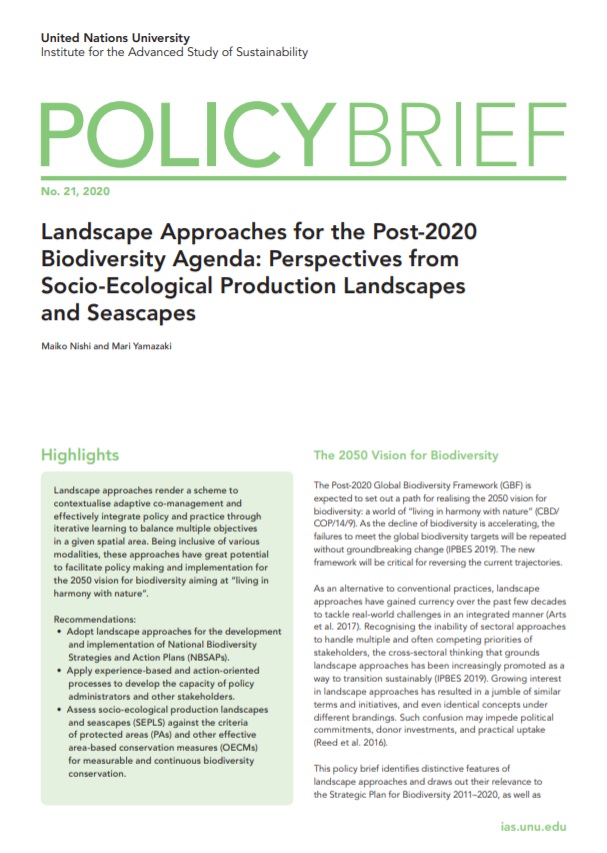
Launch of Local Biodiversity Outlooks Second Edition, 16 September 2020
IPSI member the Forest Peoples Programme would like to share the news with all readers that the second edition of the publication Local Biodiversity Outlooks will be held in an online event on 16 September at 00:01 UCT+1 (please click here for a converter to find the time in your time zone). Local Biodiversity Outlooks is described as “a landmark collaborative piece of research and analysis which acts as a companion publication to the Global Biodiversity Outlook“, focusing on biodiversity issues as experienced at a local level, by indigenous peoples and local communities around the world. Examples from IPSI and its members are included in the publication, which should be of interest to readers.
Anyone interested is encouraged to register and attend the launch event, as well as to read the publication once it is launched. The event will be held during the special virtual sessions of the CBD SBSTTA meeting on 16 September 2020. For more information about the event please visit the CBD website here and register to attend here.
Article on Landscape Approaches in Galápagos Islands
An article on landscape approaches was recently published on IPSI member Conservation International’s website by the IPSI focal point, Mr. Scott Henderson, titled “In Galápagos, novel conservation approach finds ‘sweet spot’ between production, protection”. The article does an excellent job of explaining how and why landscape approaches similar to those promoted through the Satoyama Initiative work in the real world, with an inspiring example of how a landscape approach has been successfully implemented in the Galápagos Islands. Readers are encouraged to take a look at this article, as it is a very good example for all of us working with landscape approaches.
The article can be read on the Conservation International website here.
Mr. Henderson also provided us with the below diagram, which gives a good visualization of landscape approaches:
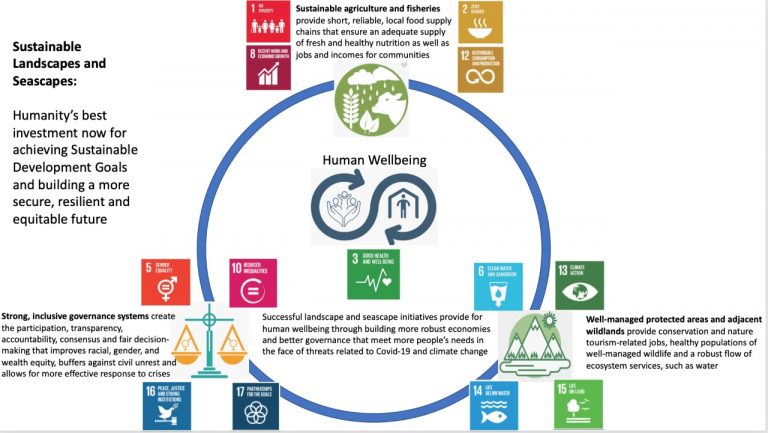
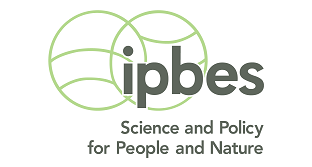
IPBES Invasive Alien Species Assessment External Review
The Intergovernmental Science-Policy Platform on Biodiversity and Ecosystem Services (IPBES) recently announced that the first external review of the assessment of invasive alien species is now open. According to the announcement, “This assessment will assess the current status and trends of invasive alien species, their impacts, their drivers, their management, and options for policy to deal with the challenges they pose. The assessment takes into account various knowledge and value systems including local and indigenous knowledge. The assessment will be solution-oriented and will provide policymakers with flexible and pragmatic response options, including strategies for prevention and adaptive management of invasive alien species.” The review is open to external reviewers, and any readers who are interested are encouraged to take part.
For more information, including instructions for how to register as a reviewer, please see the IPBES website here.
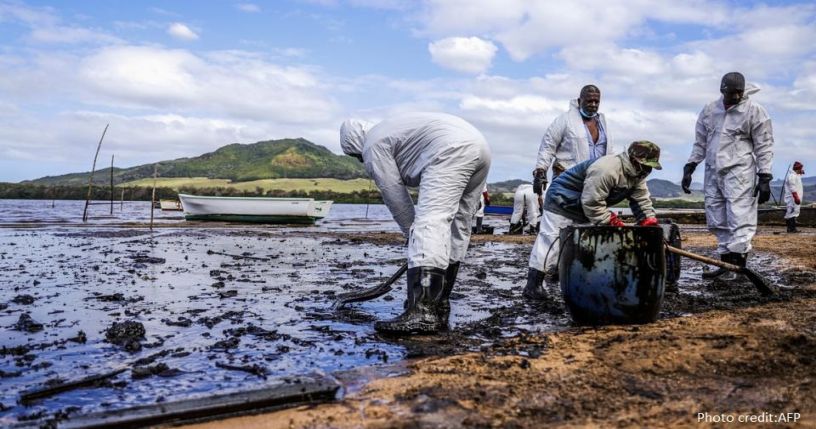
Crowdfunding for Mauritius Oil Spill
IPSI member the Environmental Protection and Conservation Organisation (EPCO) in Mauritius is raising funds for vulnerable communities living in the 13 coastal villages affected not only by covid-19 but also with the recent oil-spill where approximately 1000 tonnes of heavy oil were spilled to cover 27 square km of sea surface area. The livelihood of these communities is directly dependent on tourism and sea resources, mainly fishing, and without a single tourist in the country for the last 5 months, these vulnerable communities were solely depending on fishing and other lagoon resources. With the recent oil spill on 7 August 2020, these fishermen and sea users fear that they may never get their life back.
EPCO has a long experience working with these coastal communities and has worked on previous projects such as octopus farming, enhancement of wetlands, mangrove plantation, lagoon cleaning and mud crab farming. Funds collected will be used to provide alternative source of income though capacity building, training and demonstration project such as backyard farming, poultry, animal rearing, handicraft manufacturing, etc. The funds will also be used to set up a Start-up Seed Funding Scheme to support them financially to start up a new income generating activity. The fishermen communities with their families will be trained to carry out other income generating activities where simple skills are required.
Please click here for the crowdfunding site with further information.
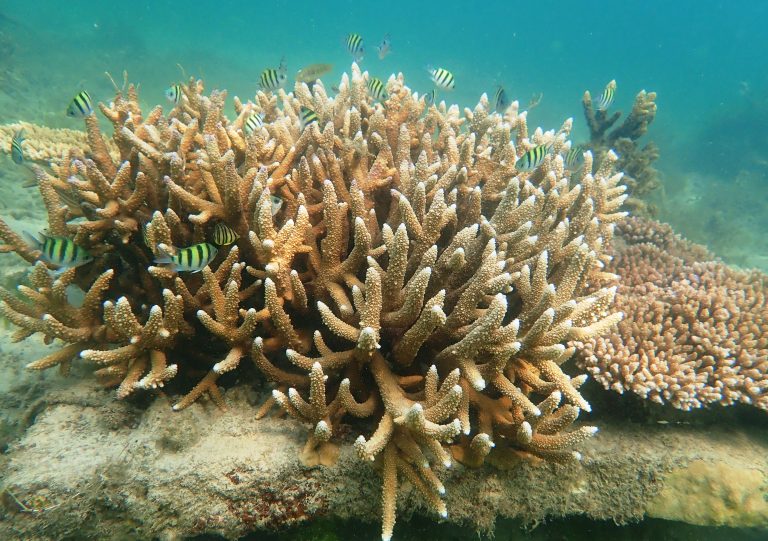
New Member Introduction: Suganthi Devadason Marine Research Institute (SDMRI)
SDMRI is a Non-Governmental organization for Research and Higher Education in Marine Sciences, established in 1998 at Tuticorin, Tamil Nadu, India. SDMRI’s research works are multidisciplinary with the primary focus on conservation and management of marine and coastal ecosystems in particular coastal habitats like coral reefs and seagrass beds and the biodiversity associated with them (survey, assessment, monitoring and rehabilitation). The other areas of its work include Integrated Impact Assessments (Environment and Social), Pollution Monitoring (Heavy metals, pesticides, microbial and marine debris including macro-, meso- and microplastics) and imparting Awareness and Capacity Building to the stakeholders.
The research and development activities focusing on coral health and rehabilitation helped in the increase of live coral and seagrass cover in areas degraded by anthropogenic (mainly destructive fishing and mining) and natural (mainly climate change) factors. The loss of coastal habitats results in the depletion of fish resources which causes greater impact on the livelihood and socio-economic conditions of the dependent fisher folk. The successful rehabilitation initiatives in particular coral and seagrass rehabilitation, and deployment of artificial reefs helped to protect and enhance not only the biodiversity but also fish production and livelihood of over 200,000 small-scale fisher folk dependent on the reef-associated fishery resources. On the coastal shores, SDMRI is actively involved in awareness building among the coastal population about the sustainable use of marine resources.
For more information, please see the SDMRI website here.
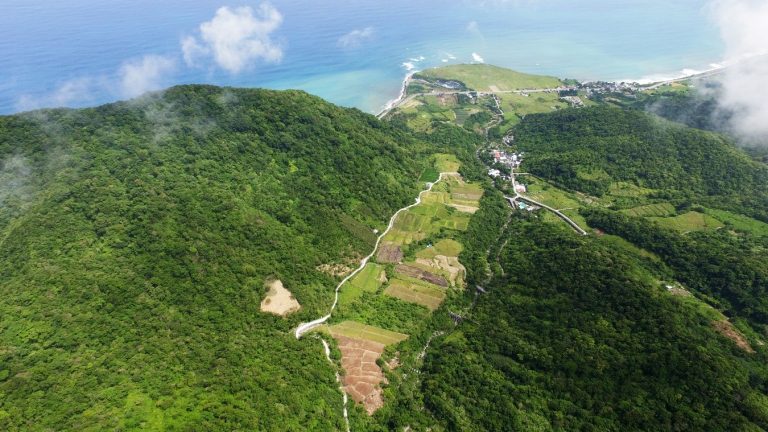
Recent Case Study: National Dong Hwa University
The IPSI Secretariat is proud this month to share one of our recent case studies from partner organization National Dong Hwa University in Chinese Taipei, titled “Towards an integrated multi-stakeholder landscape approach to reconciling values and enhancing synergies: a case study in Taiwan”, which was also included as a chapter in the Satoyama Initiative Thematic Review vol. 5.
According to the case study, it “analyzes the collaborative planning and management processes of the ‘Forest-River-Village-Sea (森–川–里–海) Ecoagriculture Initiative’ from 2016 to 2017 in Xinshe Village, Hualien County, Taiwan. Two indigenous ethnic groups – the Kavalan Xinshe tribe and the Amis Dipit tribe – and their farmlands are located in the same watershed between the national forests of the Coastal Mountain Range and the Pacific Ocean. Resource conflicts over water usage, hunting and fishing rights have happened from time to time between the tribes. In the past, different governmental agencies worked separately with each settlement based on their sectoral goals. An integrated multi-stakeholder landscape approach and cross-sector collaborative governance were required to reconcile different values and enhance synergies. (…) With potential risk factors and suggestions to their resolution outlined, this study demonstrates how a synthesis of ‘intellectual’, ‘social’ and ‘political’ capitals is capable of bridging values of various stakeholders to, on the one hand, forge a cross-border connectivity among the inhabitants, and on the other hand, encourage a cross-sector coherence among the governmental agencies engaged in the area.”
For the full case study, please see the IPSI website here.
Contact
Please be sure to let the Secretariat know if there are any changes in your e-mail address or contact information.
Secretariat of the International Partnership for the Satoyama Initiative
United Nations University Institute for the Advanced Study of Sustainability (UNU-IAS)
5–53–70 Jingumae
Shibuya-ku, Tokyo 150-8925
Japan
Tel: +81 3-5467-1212
Fax: +81 3-3499-2828
Email: isi@unu.edu
If you have been forwarded this newsletter and would like to SUBSCRIBE, you can do so on the IPSI website here.


